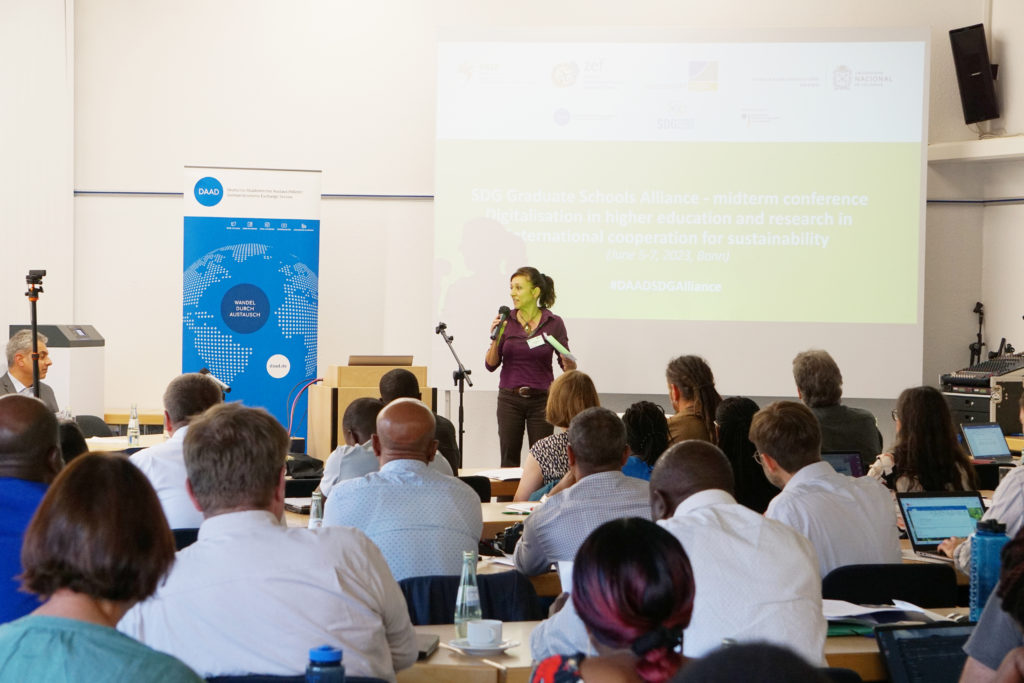June 14, 2023
The DAAD SDG Graduate Schools seek to contribute to the United Nations Sustainable Development Goals, especially SDG4: “ensure inclusive and equitable quality education and promote lifelong learning opportunities for all”. Funded by the BMZ, the program assists universities in the global south to fulfil their role as driving forces for sustainable development locally and globally, in partnership with German universities. There are four SDG Graduate Schools in Africa, two in Latin America (one of which is the ZEF-based DSSP-Colombia project, host of the Midterm Conference), and one in Asia, each focused on interdisciplinary research topics related to sustainability.

Increasing teaching capacities by incorporating information and communication technologies and internationalization are among the goals of the SDG Graduate Schools. Against this background, the seven SDG Graduate Schools (SDG-GS Alliance) celebrated from the 5th to the 7th of June a Midterm Conference on “Digitalisation in Higher Education and Research in International Cooperation for Sustainability”. The conference aimed, in general, to advance cross-regional reflection on the role of higher education, and in particular to reflect on the role of digitalisation of higher education and research in achieving the SDGs and strengthening international cooperation towards sustainability. Each SDG-Graduate School contributed with its experiences, learnings, and challenges, as well as raised questions inspired by these experiences. Also invited experts provided enriching and interesting inputs for this reflection and dialogue with members of the SDG Graduate schools.

© ZEF
Anette Braun, senior Policy Officer at the Education Division of the Ministry for Economic Cooperation and Development (BMZ), Dr Kai Sicks, DAAD Secretary General, former director of the University of Bonn International Office, and Prof. Dr Matin Qaim – Executive Director of the Center for Development Research, University of Bonn gave a warm welcome to the audience raising the advantages of digitalisation in higher education and research but also the challenges that bring this boost, especially in an international cooperation context.
Lars Gerold, Head of Section, Institution Building in Higher Education from the German Academic Exchange Service, DAAD presented the SDG GS program in DAAD showing the success of 10 years of collaboration that had resulted not just in hundreds of postgraduate scholarships around the world but in a strong and solid structure of networks and partnerships.
The first day of the conference offered insights into two dimensions of digitalisation in higher education and research: online teaching and data management. Enrico Behne from the University of Leipzig and Samant Veer Kakkar from the United Nations System Staff College (UNSSC) offered two keynotes about trends in digitalisation in sustainability and also about the experience of online teaching from a transnational study program. P.D Dr Eva Youkhana moderated a panel discussion on research data management with the participation of Susana Barrera from the National University of Colombia, Antonio Rogmann from the German Institute of Development and Sustainability (IDOS) and Dr John Jolliffe, coordinator of the NFDI4Chem initiative. Those two sessions opened the floor for a second day in which all the GS contributed with their own experiences.


The third day concluded with a final discussion and critical reflection on the practices, challenges, limitations as well as opportunities to run this digitalisation process in a more equal and fair way taking into account the digital divide and other inequalities that different regions are experiencing today.
See the full programme here and find a summary of the 2-day public part of the conference (June 5-6) here.
